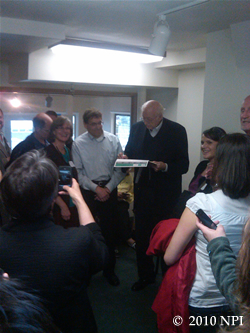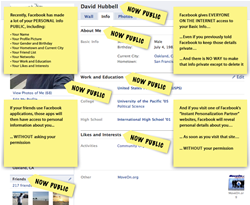Has Mozilla Firefox lost its momentum?
Lately, that's a question I've seen posed (and answered) by an increasing number of tech writers, who wonder if the world's most popular alternative to Internet Explorer has possibly reached its zenith. Many of these posts have been inspired by a discussion at an Internet gated community called Quora, which bills itself as "a continually improving collection of questions and answers". The Quora discussion began with the question,
Will Firefox have double-digit market share in 3 to 5 years?Not surprisingly, John Lilly (Mozilla's CEO) said yes, but developer (and current Facebook employee) Blake Ross — who cofounded the Firefox project while at Mozilla with Dave Hyatt — said no. He wrote, "I think the Mozilla Organization has gradually reverted back to its old ways of being too timid, passive and consensus-driven to release breakthrough products quickly."
In one sense, he's right: the wheels do seem to turn slowly at Mozilla, as far as development on the main products goes, which has resulted in long waits for new releases of the Foundation's flagship products, Firefox and Thunderbird. But, as far as I can tell, that seems to be the way it's always been.
As Ross knows, the program that became known as Mozilla Firefox wasn't written from scratch overnight. It evolved from the Mozilla Application Suite (which, incidentally, is still maintained today as SeaMonkey by the Mozilla community). The browser's first stable release was on September 23rd, 2003, but it wasn't until mid-2004 that the browser started to pick up steam. (That was about the time when I discovered Firefox and began using it.)
It took another two years for Firefox to crack ten percent of browser market share (according to Net Applications). These days, Firefox's market share is closing in on the twenty five percent mark, which is pretty impressive.
I mention this because I think it's important to recognize that Firefox's relative growth has been slow and steady, just like the pace of innovation at Mozilla.
Mozilla has made some solid improvements to Firefox over the years, introducing features I now take for granted, like automated crash recovery, instant personalization, and the ability to reopen accidentally closed tabs.
While I truly believe such features have made Firefox more dependable and helpful, as a power user, I'd like to see development focus heavily on two priorities:
performance and
speed. I put Firefox through a lot: when I'm researching several things at once (as is often the case) I often have more than a hundred tabs open. What's more, I've got close to a dozen add-ons enabled to protect my privacy and security, and backup my data.
So I can't blame Firefox for consuming a large amount of memory. Nor can I blame the browser for ocassionally hanging and freezing; that's what happens when you test the limits of an application. No other browser out there can do for me what Mozilla Firefox does. No other browser offers as many extensions. All the same, it
would save me time if Firefox could carry a heavy load more adeptly.
Fortunately, the fine folks over at Mozilla seem to have realized the direction they need to be heading. Case in point:
Coming in a future automatic update to Firefox 3.6 is functionality that stops Adobe Flash, Apple QuickTime, or Microsoft Silverlight from taking down the whole browser in the event one of those plugins happens to crash. Instead of having Firefox conk out on them, users will see a friendly notifcation prompting them to restart the plugin by simply reloading the page.
And Mozilla's Mike Beltzner
has outlined a vision for the next version of Firefox which sounds pretty sweet. Earlier this month, he wrote:
Today, I presented an early product plan for Firefox 4 to the Mozilla community (live, over the web!) to share our vision for the next version of Firefox, and what projects are underway to realize it. Then I invited everyone to get involved by joining our engineering or product development efforts.
The primary goals for Firefox 4 will be making a browser:
- Fast: making Firefox super-duper fast
- Powerful: enabling new open, standard Web technologies (HTML5 and beyond!),
- Empowering: putting users in full control of their browser, data, and Web experience.
Beltzner's presentation has convinced me that the answer to the question,
Has Mozilla Firefox lost its momentum? is a big
no. I believe Mozilla is making the proper adjustments to its road map to keep up with the demands of users like me.
I know there are people out there who swear that Chrome is the best browser around, but I don't agree. My biggest problem with Chrome is that Google distributes it, and I don't trust Google. I don't like that they invade the privacy of their users without their consent (remember the Buzz catastrophe?)
The code that Google Chrome is based on (Chromium) happens to be open source, however, so it is possible to install a non-Google version of Chrome on one's computer which
lacks all of the proprietary spyware Google slaps on to its distribution. And I've done that, testing out a Chromium build called ChromePlus, which doesn't appear to me to be any faster than Firefox.
As I noted earlier, what I love most about Firefox is that I can lock it down. I can selectively control which websites get to execute JavaScript, place cookies on my machine, or make requests to external domains for content. I can effectively and thoroughly block "web bugs" and beacons, and stop plugins from running amok.
And I can securely back up my browsing history and bookmarks using a killer add-on called
Weave, developed by Mozilla itself. Weave is one of the many projects in development at
Mozilla Labs, the Foundation's innovation playground.
I think the fact that Mozilla has a Labs is proof that it has not turned into slow, passive organization as Blake Ross suggests. I was one of the first users of Weave, and in just a few months, it has improved by leaps and bounds. It is a must-have extension. What it does is encrypt your bookmarks, browsing history, passwords, preferences, and tabs, then continuously synchronize them between all of your different instances of Firefox.
Let's say you're using Firefox on Ubuntu at a cafe while waiting for a friend to show up for coffee. You stumble across a web page you really like but you don't have time to read it. So you bookmark it. When you come home, you turn on your desktop monitor and unlock Windows. You maxmize Firefox from the taskbar, open the Bookmarks menu, and voila... there's that web page you saved earlier! The bookmark you created in Firefox on your laptop now exists in Firefox on your desktop too, because you have Weave in each of your Firefox installations.
Weave is basically to bookmarks what IMAP is to email. It is so stable now that it is no longer considered to be experimental. Consequently, it is scheduled to be rebranded soon as Firefox Sync. It looks like it is on its way to possibly being incorporated into the browser's core code like Personas was.
As long as Mozilla keeps pushing forward, I don't see Firefox's market share being siphoned off by Chrome (or another browser). Chrome's growth to date has not hurt Firefox. For every Firefox user who has switched to Chrome (it seems almost every Chrome convert has an ancedote about coming from Firefox), there is an Internet Explorer user who has switched to Firefox.
In other words, the growth of both Firefox and Chrome is happening at IE's expense. The numbers support this. Two years ago, IE had 76% market share, according to Net Applications. Now it's dropped to 59.79%.
In the same time period, Firefox has gone from 19.07% to 24.63%, while Chrome has gone from 0.37% to 6.79%.
Microsoft is working on a new version of Internet Explorer which is supposed to be better in almost every respect (especially in its support of web standards). But IE 9 won't be available for Windows XP users, much like IE 7 was not available to users of Windows 2000. So that leaves Mozilla with an oppotunity to continue poaching IE's market share. It will be able to offer a better browser because IE has no future on Windows XP; it's already as good as it's going to get.
I think the success Firefox has achieved to date is perhaps the best evidence that it is headed up, not down. There are a lot of people who care about making this software better, and I'm one of them. As long as Firefox has users who care about its future, it will most assuredly have a future.
 Today's photo is another taken by Jeffrey Dubinsky for Gulf Restoration Network from aboard an aircraft flying over Lousiana's Redfish Bay last Thursday. (Click on the thumbnail to see a full size version of the image).
Today's photo is another taken by Jeffrey Dubinsky for Gulf Restoration Network from aboard an aircraft flying over Lousiana's Redfish Bay last Thursday. (Click on the thumbnail to see a full size version of the image).



 I attended the party, and was impressed by the energy and enthusasim I saw. Rarely have I seen progressives so eager to collect signatures for ballot measure. Must be the pent-up frustration many progressives feel after years and years of inaction and dithering in Olympia, which has left us with a horribly regressive and utterly broken tax structure.
I attended the party, and was impressed by the energy and enthusasim I saw. Rarely have I seen progressives so eager to collect signatures for ballot measure. Must be the pent-up frustration many progressives feel after years and years of inaction and dithering in Olympia, which has left us with a horribly regressive and utterly broken tax structure.
